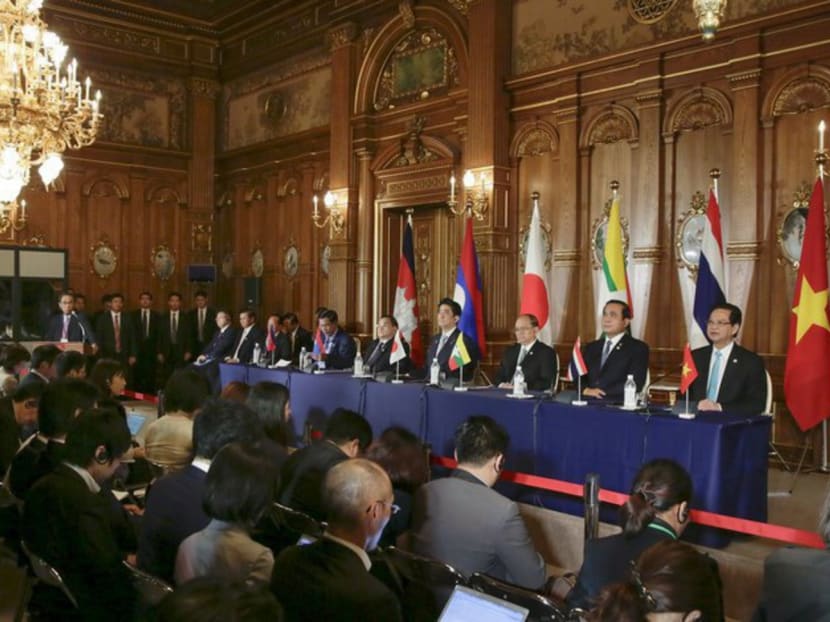Mekong states avoid irking China at summit with Japan
TOKYO — Leaders of Japan and five South-east Asian countries along the Mekong River largely steered clear of addressing Beijing’s controversial building of artificial islands in the South China Sea at a joint press conference over the weekend, with nations in the Mekong region, except Vietnam, reluctant to draw China’s ire by appearing to be on Tokyo’s side.

Leaders from Mekong countries and Japan attend a joint news conference of the 7th Mekong-Japan Summit Meeting at Akasaka State Guesthouse in Tokyo, Japan, July 4 2015. Photo: Reuters
TOKYO — Leaders of Japan and five South-east Asian countries along the Mekong River largely steered clear of addressing Beijing’s controversial building of artificial islands in the South China Sea at a joint press conference over the weekend, with nations in the Mekong region, except Vietnam, reluctant to draw China’s ire by appearing to be on Tokyo’s side.
At the press conference, Japanese Prime Minister Shinzo Abe and Vietnamese Prime Minister Nguyen Tan Dung said they “shared serious concerns over unilateral attempts to change the status quo”, without singling out China but in apparent reference to its maritime assertiveness.
“Our countries will further cooperate in building order at sea, on land and in the air,” Mr Abe and Mr Dung said after a summit involving Japan, Cambodia, Laos, Myanmar, Thailand and Vietnam. Mr Dung added that he and Mr Abe agreed on the importance of upholding freedom of navigation in the disputed waters.
Tensions in the South China Sea have been exacerbated recently because of Beijing’s reclamation work. Recent US surveillance imagery showing China close to completing a 3km airstrip on one of the newly created islands has raised fears of militarisation.
Beijing claims sovereignty over most of the South China Sea, which is vital to shipping and also believed to house rich fishing grounds. Among the Mekong River nations, only Vietnam is a rival claimant in the dispute. The Philippines, Malaysia, Brunei and Taiwan also have overlapping claims.
Mr Dung also asked Japan for new patrol boats to protect his country’s seas, to which Mr Abe responded that Tokyo would discuss the matter to make it happen at an early date, said Japan’s Foreign Ministry.
In the joint outcome document of the Japan-Mekong summit, leaders said: “Both sides noted concerns expressed over the recent development in the South China Sea, which will further complicate the situation and erode trust and confidence, and may undermine ... peace and stability.”
The “recent development” is a veiled reference to China’s large-scale land reclamation. The language used here is weaker than that in a statement issued after an Association of South-east Asian Nations (ASEAN) summit in Malaysia in April. Said statement read: “We share the serious concerns expressed by some leaders on the land reclamation undertaken in the South China Sea, which has eroded trust and confidence and may undermine peace, security and stability in the South China Sea.”
Advocating an Asia ruled by international law rather than the use of force, Japan has opposed Beijing’s growing assertiveness in the South China Sea. Tokyo is also embroiled in a row with Beijing over a group of Japanese-administered, Chinese-claimed islets in the East China Sea.
While hailing Japan’s pledge on Saturday of fresh aid to Mekong nations worth ¥750 billion (S$8.22 billion) from 2016 to 2019 to promote stability and growth, analysts told Kyodo News that ASEAN does not wish to become a theatre for power rivalry.
All the Mekong states except Thailand are less developed than the rest of ASEAN, and “it is very important for Japan to help these four countries narrow the development gap ... so we can have a more cohesive ASEAN,” said Jakarta-based Centre for Strategic and International Studies’ executive director Rizal Sukma.
It is in the interest of both Japan and China to help ASEAN become a coherent and neutral regional entity that does not take sides in the rivalry between the US and China, and between Japan and China, said Mr Sukma. KYODO NEWS






